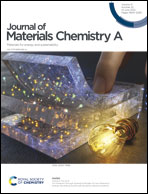Fabrication of ultra-thin, flexible, dendrite-free, robust and nanostructured solid electrolyte membranes for solid-state Li-batteries†
Abstract
Bulk solid electrolyte-enabled solid-state lithium batteries with high energy density and better safety features are proposed to revolutionize battery-operated electric vehicles and other defense appliances. However, poor contact, high interfacial resistance, and inhomogeneous metallic lithium growth are the severe concerns associated with inorganic solid electrolytes. In this regard, solid polymer electrolytes are promising options for solid-state lithium batteries. Although ion-conducting ceramic incorporation has long been sought for polymer reinforcement, their discontinuous and inhomogeneous distribution inside the polymer network hinders ionic transportation. Further, the excess use of such ionic conducting additives reduces the overall mechanical and thermal properties, which in turn results in the poor performance of lithium batteries. In this study, the percolation of nanofibers in the polymer networks is optimized to obtain ultra-thin, flexible, dendrite-free, robust, and high-performance nanostructured solid electrolyte polymer composite (NSPC) membranes. Nano-engineered NSPC membranes exhibit high flexibility, good electrochemical stability (∼5 V vs. Li metal), high thermal endurance (up to 150 °C), and high mechanical strength (7.3 MPa). The Li-stripping/plating studies of the NSPC membrane indicate reversible deposition/de-solvation of lithium at the electrode–electrolyte interface without any dendritic growth, which is further supported by ex situ FESEM and XPS analysis. Furthermore, the NSPC membrane offers intimate solid–solid contact with minimal area surface resistance (ASR < 30 Ω cm2) when it is utilized in Li-metal batteries with a high potential cathode, i.e., LiNi1/3Co1/3Mn1/3O2. The excellent specific capacity (∼170 mA h g−1), rate capability, and cyclability are further obtained. Based on the cost-effective development and excellent performance, the presently developed nanostructured polymer composite membrane may be considered well suited for advanced solid-state Li-batteries.



 Please wait while we load your content...
Please wait while we load your content...